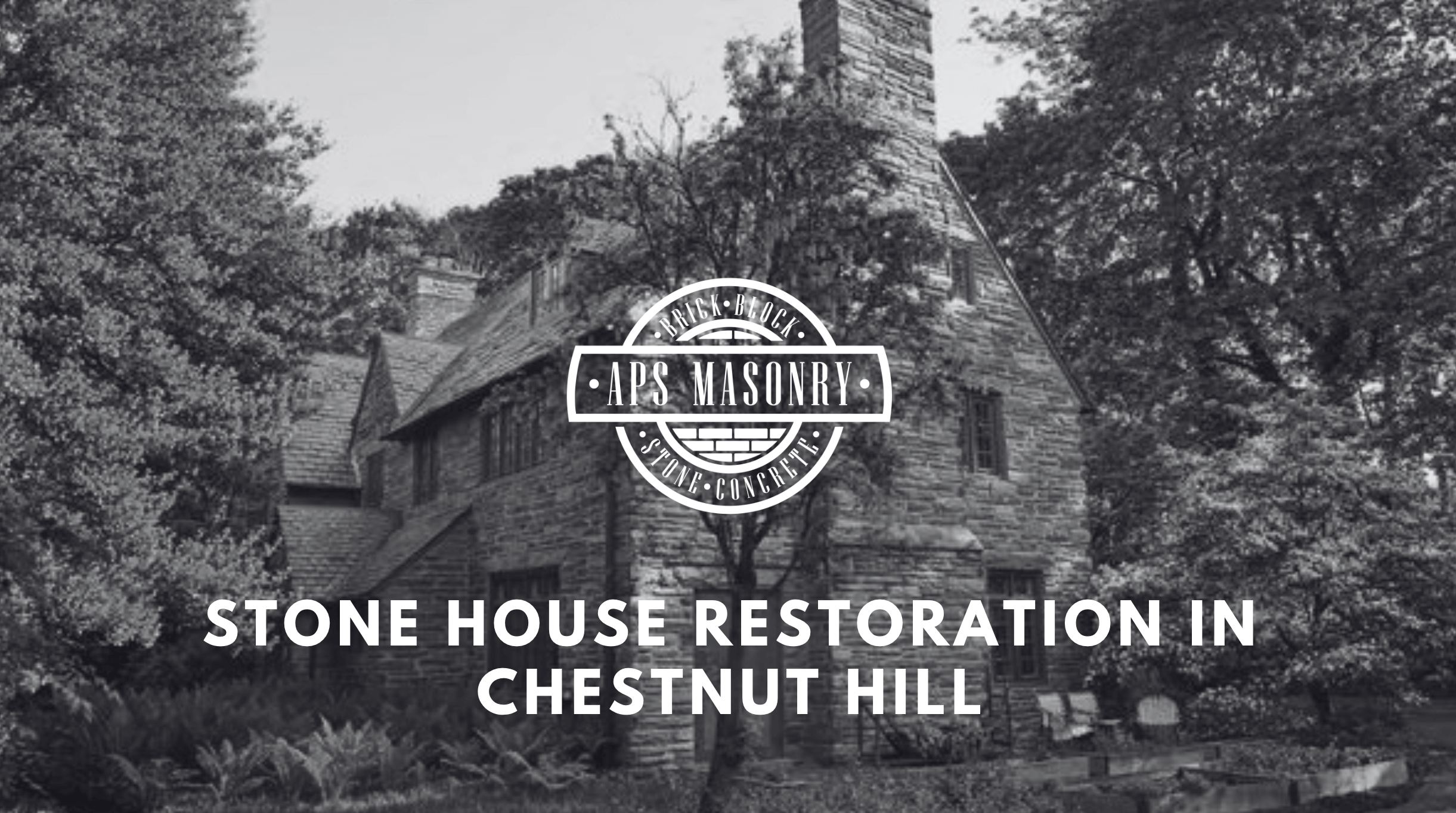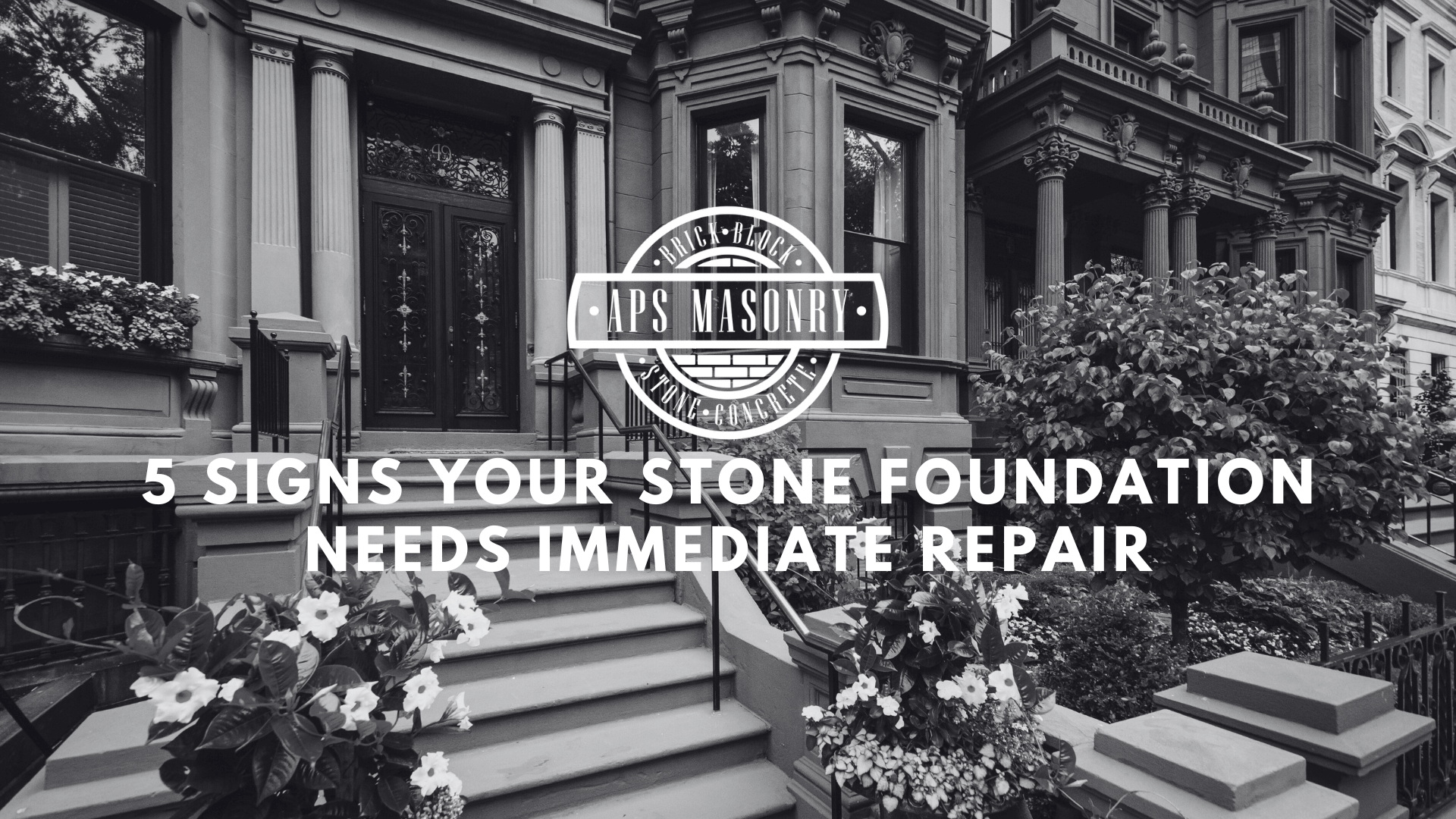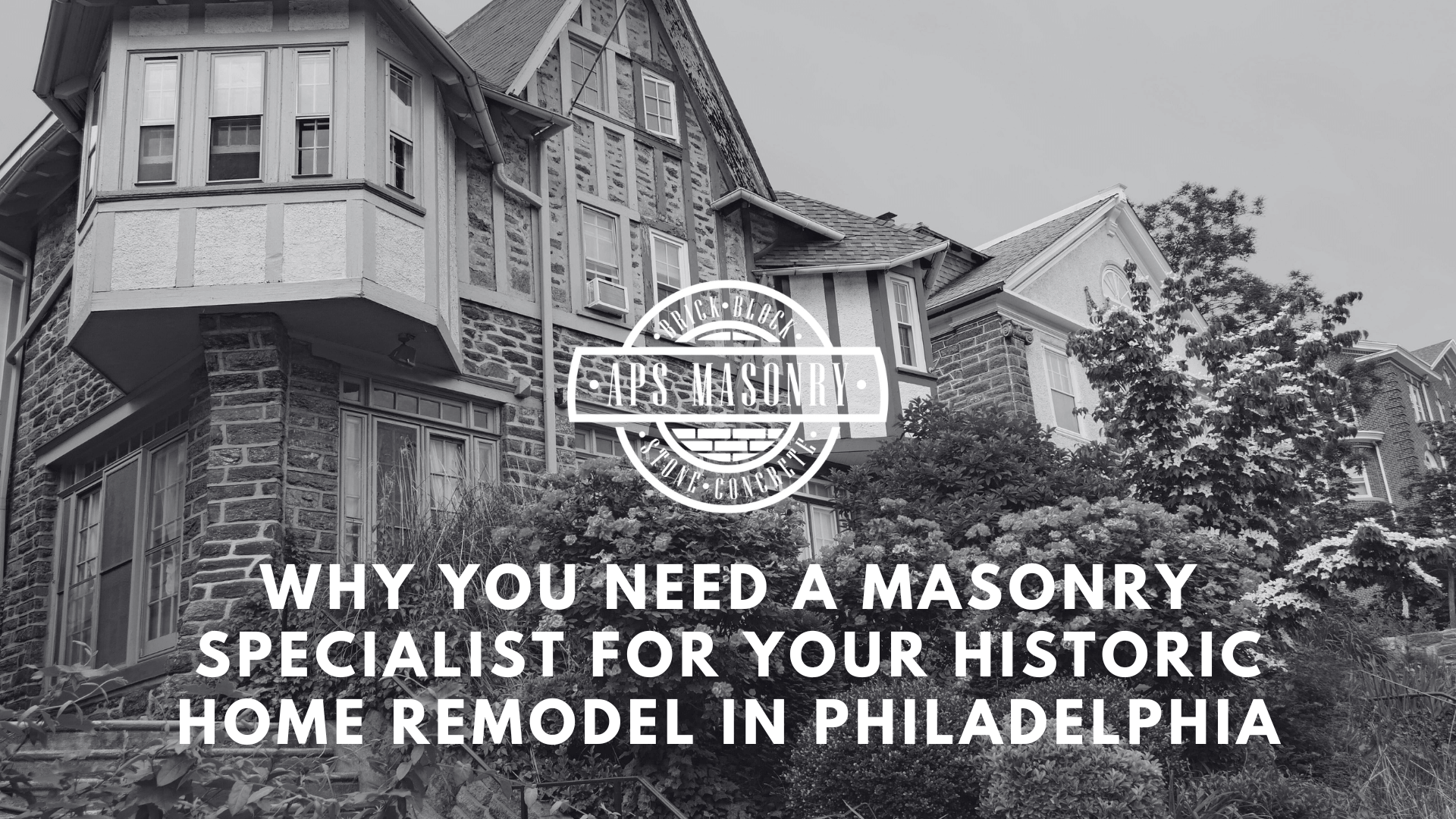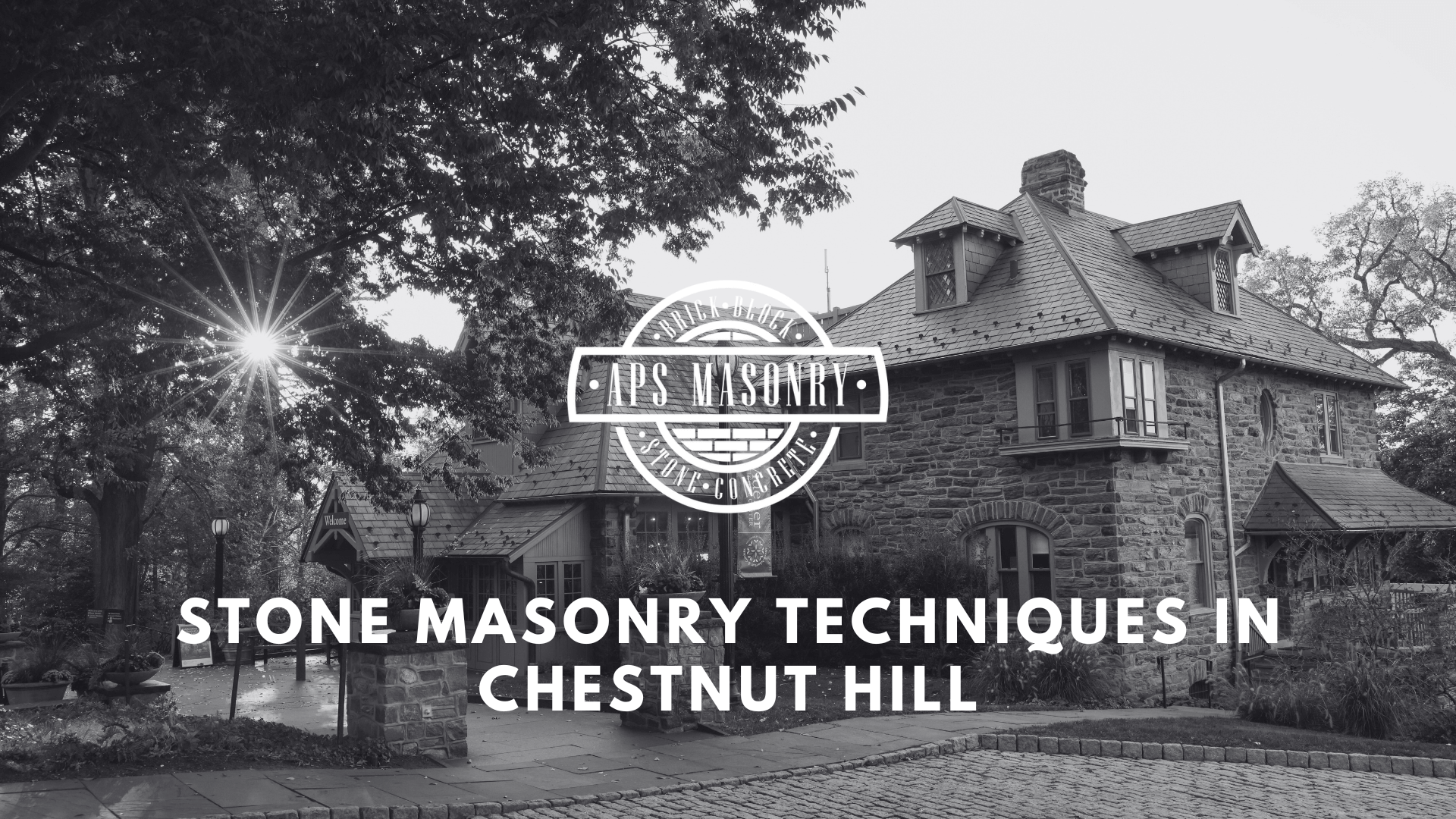5 Signs Your Stone Foundation Needs Immediate Repair
Stone foundations are a staple in Philadelphia’s historic homes. From South Philly rowhomes to Mount Airy twins, these structures were built to...

Preserving the stonework of Chestnut Hill homes takes more than good materials—it takes skilled masons who know the history behind every joint.
Stone house restoration in Chestnut Hill is a responsibility as much as a service. Many of these homes were built between the late 1800s and 1930s, using Wissahickon schist, fieldstone, and lime-based mortar laid by hand. That kind of masonry work doesn’t respond well to shortcuts or quick fixes. The original materials were soft, flexible, and meant to breathe. Today, replacing or repairing them with the wrong method causes more damage than age ever did.
In neighborhoods like Chestnut Hill, where preservation efforts are active and the architectural heritage is highly visible, small mistakes carry lasting consequences to the historic charm of the area. A mismatched mortar joint on a front porch or an over-poured concrete walkway throws off the look of the entire project. Local homes are often listed on the National Register of Historic Places and monitored by the Chestnut Hill Conservancy. Homeowners, even those new to the area, are expected to maintain the historic character of their property, whether it’s a full restoration project or minor repointing on the first floor.
APS Masonry Contracting specializes in working on historic homes across Chestnut Hill. From the foundation to the front steps, we help preserve what makes these properties distinct. Get in touch today to discuss your home’s age, materials, and what it needs to stay strong for the next century.
Masonry restoration in Chestnut Hill starts at the mortar joint, not the stone. Original builders used lime-based mortar, mixed on-site using local sand and hydrated lime. This allowed each stone house to flex with the seasons, resist water, and remain breathable. Skilled masons tool each joint to blend with the face of the wall, not distract from it. When the detail is right, the repair vanishes into the building.
Many historic homes in Philadelphia were damaged by hard Portland cement repairs in past decades. Cement locks moisture in, cracks in cold weather, and fractures surrounding stone. Repairs done without proper knowledge reduces a property's standing on the National Register of Historic Places and creates structural risk. When repointing is done wrong, water seeps in, stone starts breaking from the edges, and by the time the issue spreads across a façade, full wall rebuilds can exceed $40,000. That’s before interior plaster, floors, or structural bracing are even touched.
Private owners in Chestnut Hill carry responsibility for preserving their home's visible surfaces, especially along shared property lines and on the main house elevation. The Chestnut Hill Conservancy monitors exterior work closely. A mismatched joint, wrong mortar mix, or overworked tooling compromises the historic character of the entire project. Professional masonry services with experience in heritage methods are not just preferred, they are required if the goal is to maintain value and avoid redoing the work in a few years.
Stone foundations in Chestnut Hill were often built without reinforcement, relying on mass, fit, and balance. Many used dry-laid Wissahickon schist, with no vapor barriers or footings by modern standards. In the early 1900s, this worked. The weight held everything in place. Today, that same foundation must resist vehicle vibrations, water redirection, and soil shifts from decades of nearby new construction.
Across Philadelphia, minor cracks and uneven grades often go unchecked until the damage becomes visible. Bulging stone walls, interior settling, or stepped cracking in joints typically signal movement in the foundation or retaining wall. Foundation repairs caught early may cost between $6,000 and $15,000. If ignored, it often results in structural excavation and partial demolition. Full rebuilds from advanced bulging regularly cost over $40,000, and adjoining interior floors or walls may need to be replaced as well.
In Chestnut Hill, private owners are expected to maintain stability along shared lines, visible elevations, and walkout basement zones. Residential masonry repairs that change exterior layout, exposed stonework, or basement entryways often require permits and documentation. Restoring the original alignment while preserving historic materials is the difference between a long-term fix and a recurring liability.
Many older homes in Chestnut Hill were built with oversized stone chimneys tied directly into the main house. These chimneys once supported wood and coal systems, often vented through double-flue stacks built from Wissahickon schist. When no longer needed, some were left to decay. Others were parged, capped, or partially removed with no plan to match the surrounding stone.
A neglected or partially removed chimney will lead to water intrusion, thermal cracks, and discolored walls, especially where stucco was used to hide original stone. Rebuilding or removing the chimney properly means matching the depth, tooling, and material of the wall behind it. A chimney left to fail can pull masonry away from the house, leak water into attic beams, and collapse internally. If patching is ignored, homeowners may face repairs well above $15,000, including structural wall tie-ins and material matching to meet preservation guidelines.
Private owners in Chestnut Hill are expected to maintain the original exterior appearance, even when removing architectural features. The Chestnut Hill Conservancy and Philadelphia Historical Commission may require documentation, especially if the chimney is visible from public streets. Professional masonry services should handle these projects from start to finish, creating a seamless transition between the new wall face and the home’s past structure.
Walkways and porches in Chestnut Hill homes were often built using hand-cut bluestone or salvaged brick, set in lime mortar or dry-laid patterns. These materials were chosen for their strength and finish, not just availability. When properly installed, they created a seamless entry from street to front porch.
Many properties today show cracking steps, tilted walkways, or patched areas where quick-set mortar was used after freeze damage. Brick patio edges shift over time without stable ground or proper drainage. Restoring or rebuilding these features requires matching slope, stone size, and mortar profile. A complete walkway or porch masonry project can range from $6,500 to $18,000 depending on layout, elevation changes, and whether new additions are needed to accommodate doors or transitions between floors.
In Chestnut Hill, homeowners are expected to repair visible masonry with care for the home’s original design. If a front porch connects to historic stone or leads into a shared retaining wall, the project involved may require approval. Professional masonry services allow owners to restore beauty, improve safety, and create outdoor areas that align with the historic environment while supporting modern use.
Basement walls in Chestnut Hill homes were rarely finished when originally built. Most were made from fieldstone or rubble, often exposed on the interior and laid without waterproofing. These materials were designed to breathe and drain, not to seal. Historic builders allowed water to move through carefully, relying on slope, air movement, and gravity to maintain function.
Today, many of these homes have been finished without that history in mind. Interior coatings, vapor barriers, and improper insulation often trap moisture, leading to stone decay, visible efflorescence, or softening mortar along the floor line. Once trapped, water accelerates joint failure and can compromise nearby slab work. Mold remediation, full wall rebuilds, and slab correction from long-term water damage regularly exceed $30,000, not including losses in energy efficiency or resale value.
For the Chestnut Hill homeowner, these are key structural decisions. Poor below-grade masonry can lead to rot, mold, and declining energy efficiency in the main house. APS works directly with the owner to develop a scope that respects the original build while improving long-term durability. Our masonry services in basement spaces are focused on stabilization, correction, and rebuilds that hold up to time, climate, and local codes.
Masonry work in Chestnut Hill means understanding more than mortar. It means knowing how historic buildings breathe, how they shift, and how they’ve lasted this long. Whether the project is residential, mixed-use, or part of an adaptive reuse upgrade, the goal is the same: preserve what's original while adding long-term strength.
APS Masonry Contracting works on commercial masonry services as well as detailed restoration across single-family homes and multifamily properties. Our team designs each masonry project around the site, the material, and the structure’s intent. No two walls carry the same loads, and no two properties respond the same way to repairs. That’s why every job we take on starts with an initial consultation focused on the building’s condition and the owner’s goals.
Our work helps create a new life for older properties, whether it's rebuilding a failing entryway or restoring energy efficiency in a 100-year-old basement. We develop a customized plan based on real field conditions, not guesswork. The APS team works directly with property owners to understand your next masonry project with results that fit the community it serves—block by block, detail by detail.

Stone foundations are a staple in Philadelphia’s historic homes. From South Philly rowhomes to Mount Airy twins, these structures were built to...

APS delivers expert masonry restoration services that preserve structural integrity and restore historic masonry across Philadelphia.

Stone masonry techniques in Chestnut Hill built to last. APS delivers quality craftsmanship, masonry repair, and full restoration for historic homes.